Health
3rd Award Ceremony of the Paediatric Heamatology and Oncology Fellowship: Profiles of the Fellows
Published
7 months agoon
By
Mak Editor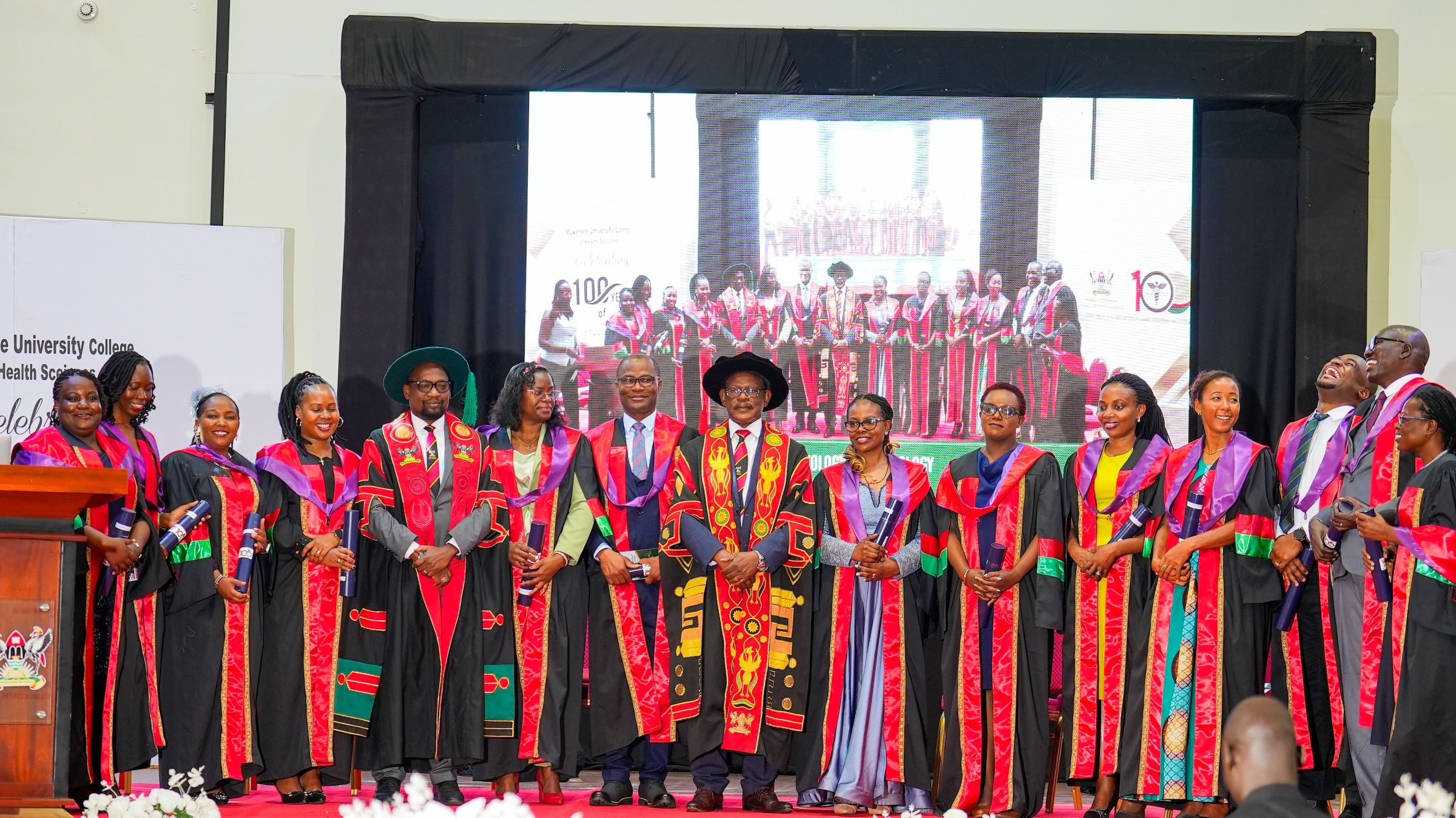
Makerere University College of Health Sciences (MakCHS) in collaboration with Texas Children’s Global Hospital, Baylor College of Medicine Children’s Foundation–Uganda, the Ministry of Health (MOH) of Uganda, and Mulago National Referral Hospital (MNRH), established the Paediatric Haematology and Oncology Fellowship (PHO) Program to build capacity and strengthen care for children with cancer and blood disorders across the country and the region.
Since its inception in 2016, 24 pediatricians have been trained by the program and now serve as leaders in Paediatric Haematology and Oncology clinical services across ten hospitals in seven countries in Africa. This marks a remarkable transformation from just two trained paediatric oncologists in Uganda in 2016 and has contributed to significantly improved survival rates for children with cancer and blood disorders.
On the 30th July 2025, 16 Fellows of the PHO Fellowship received their awards after a two-year stint on the fellowship. Below are their profiles
2018/2020 Cohort
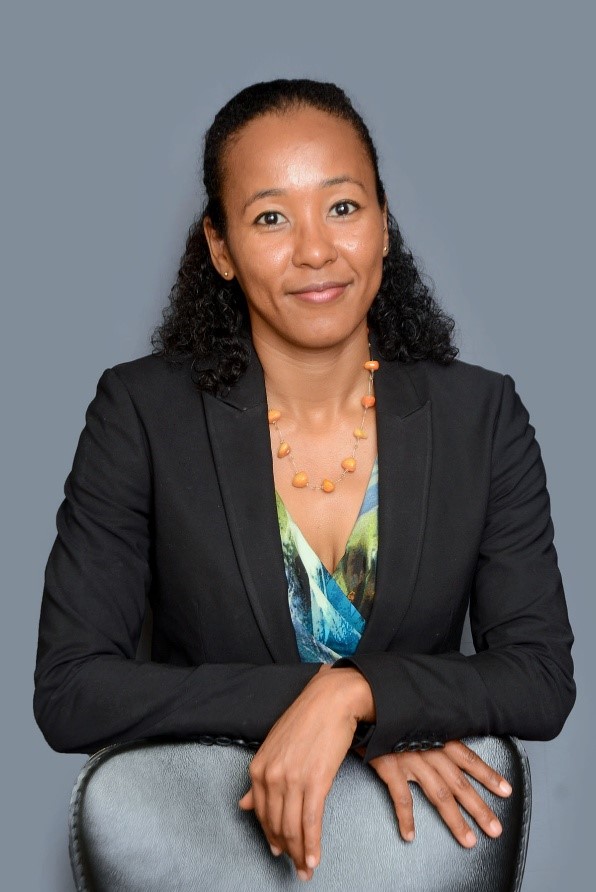
Dr. Nana Nakiddu is a Paediatric Haematologist and Oncologist and lecturer at Muhimbili University of Health and Allied Sciences/Muhimbili National Hospital in Tanzania. Her career focus is on developing innovative models for the delivery of childhood cancer survivorship care in low- and middle-income countries, particularly in sub-Saharan Africa, where cancer survivorship care is still in its early stages despite major advancements in access to diagnosis and treatment. Her ultimate career goal is to lead research and care initiatives for the growing population of childhood cancer survivors across Africa. She is passionate about sports and has represented Uganda internationally in swimming. As a qualified sports medicine physician, she contributes to the field both nationally and globally. She currently serves as the Secretary General of the Uganda Society for Sports Medicine and is the immediate past chairperson of the Uganda Olympic Committee’s Medical and Anti-Doping Commission.
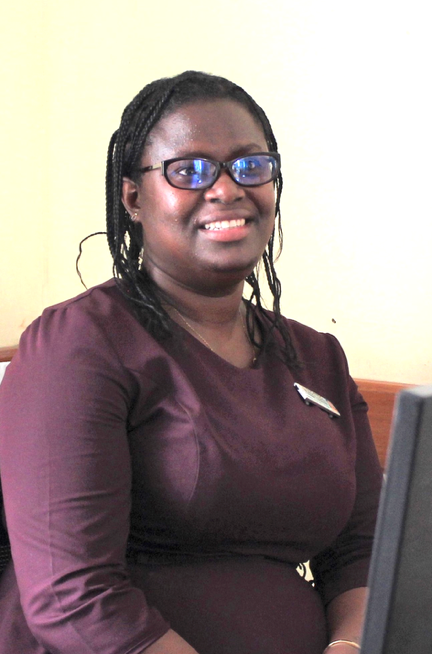
Dr. Heronima Joas Kashaigili is a Pediatric Hematologist and Oncologist at Bugando Medical Centre and a lecturer Catholic University of Health and Allied Sciences in Mwanza Tanzania. She is the Assistant Head of Oncology Services and leads the Pediatric Hematology and Oncology Unit at Bugando Medical Centre. She is recognized nationally as a mentor and leader in advancing pediatric cancer care to improve survival outcomes through capacity-building initiatives.
Dr. Kashaigili earned her medical degree from the Catholic University of Allied and Health Sciences in 2009. She specialized in Pediatrics and Child Health at Kilimanjaro Christian Medical College in 2017 and completed a fellowship in Pediatric Hematology and Oncology at Makerere University College of Health Sciences in 2020 with support from the Texas Children’s Global HOPE program. She also has training and experience in clinical research and is currently pursuing a Master of Science in Global Child Health (MSGCH).
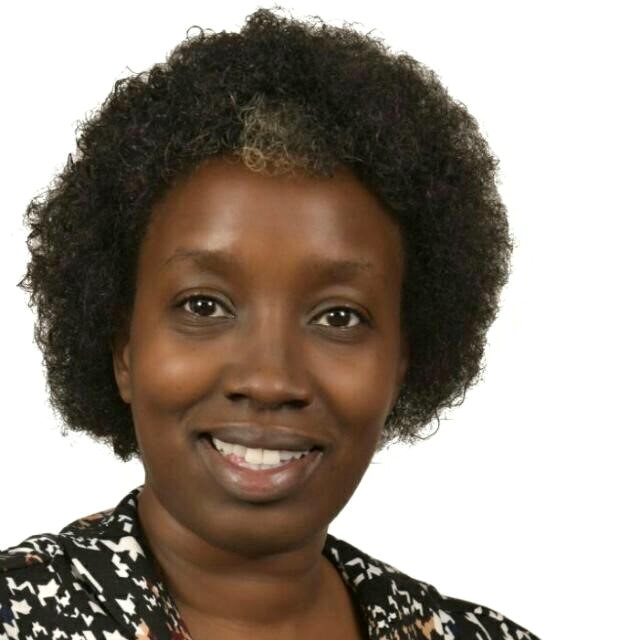
Dr. Deborah Omeddo is a Paediatric haematologist and oncologist at Kisii teaching and Referral hospital and an adjunct lecturer at both the Kenya Medical Training college and Kisii University in Kenya. She has practiced as a paediatrician for the last 15 years during which she has keenly participated in research and clinical care of children. She has a passion for childhood haematological care and especially in Sickle cell disease. She has been a keen advocate for access of affordable care for sickle cell disease patients and is a patron of a number of the Sickle cell disease foundations. She has served in the Kenya paediatric association board where she advocated for childhood malnutrition and access to nutritional supplements. She is a member of the Kenyan ministry of health technical working group on childhood cancer where she has participated in development of management policy and guidelines. Her career goal has been to improve the research and clinical management of Sickle cell and other haematological disorders among children in sub-Saharan Africa.
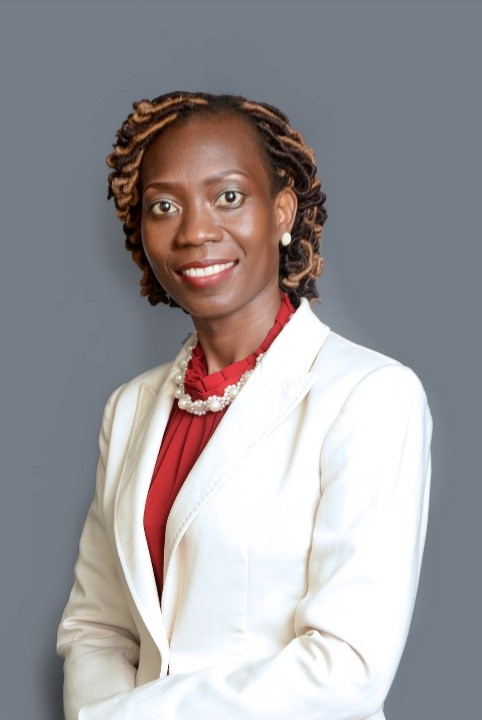
Dr. Anne Akullo is a Pediatric Hematologist and oncologist and the current President of the Uganda Pediatric Association. She is the Associate Director of Clinical Operations for the Texas Children’s Hospital Global HOPE (TCH-GH) supported programs in Africa, where she leads the Dissemination and Implementation Science program. She is passionate about advocacy for child health and uses the UPA platform to promote high-impact policies for child health initiatives, such as the scale-up of sickle cell disease care on a national scale. Dr. Akullo completed her medical degree from Makerere University College of Health Sciences in 2005, followed by a specialization in Paediatrics and Child Health at Makerere University College of Health Sciences in 2014. She completed a Fellowship in Pediatric Hematology and Oncology at the same institution in 2020, supported by Texas Children’s Global HOPE. In addition, she has training and experience in Project Management, Implementation Science, and child health advocacy.
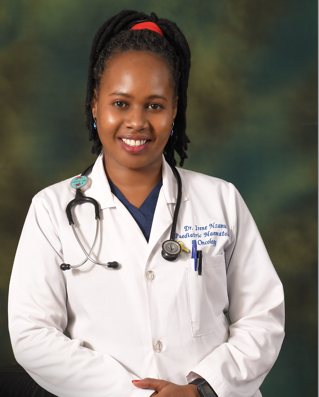
Dr. Irene Nzamu is the Head the Pediatric Haematology and Oncology Unit at Kenyatta National Hospital (KNH) and an honorary lecturer in the Department of Paediatrics in the University of Nairobi. Dr. Nzamu chairs the Hospital Blood Transfusion Committee and is deputy chair of the Hospital Ethics Committee. Nationally, Dr. Nzamu is the paediatric lead in the Focal Team for the Kenya National Cancer Control Strategy, is a member of the Ministry of Health’s Technical Working Group on Childhood Cancer and is actively involved in the establishment of the Kenya Pediatric Hematology and Oncology Society. She has served as Treasurer in the Kenya Society of Hematology Oncology (KESHO).
She earned her both her undergraduate and post graduate degrees from the University of Nairobi in 2005 and 2012 respectively. She completed the clinical fellowship in pediatric hematology and oncology training at Makerere University College of Health Sciences supported by Texas Children’s Global HOPE in 2020. She is a graduate of the African Leadership University Public Sector leadership fellowship and has undertaken several trainings from the University of Washington. She is passionate about providing evidence-based childhood cancer care targeting to bridge the gap in survival for children in Low Middle-Income Countries.
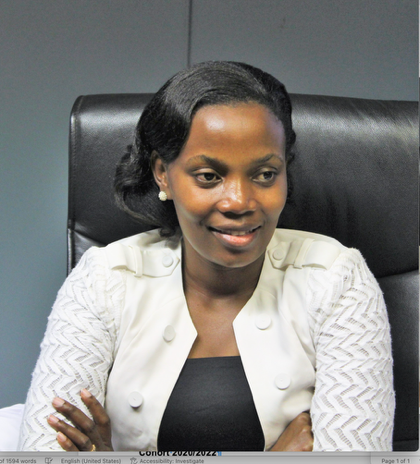
Dr. Ankunda is a Pediatric Hematologist and Oncologist based at the Cancer Center of Mbarara Regional Referral Hospital (MRRH) in Western Uganda. She previously served as a lecturer in the Department of Pediatrics and Child Health at Kabale University. She has spearheaded numerous childhood cancer awareness campaigns and conducted research focused on understanding the reasons for treatment abandonment among children with cancer. Her research interest is in solid tumors with a focus on understanding their biology in sub-Saharan Africa and improving the survival of children affected by solid tumors.
Dr. Ankunda earned her medical degree from Makerere University College of Health Sciences in 2010, followed by a specialization in Paediatrics and Child Health at Mbarara University of Science and Technology in 2017. She completed a Fellowship in Pediatric Hematology and Oncology at Makerere University College of Health Sciences in 2020, supported by Texas Children’s Global HOPE.
2019/2021 Cohort
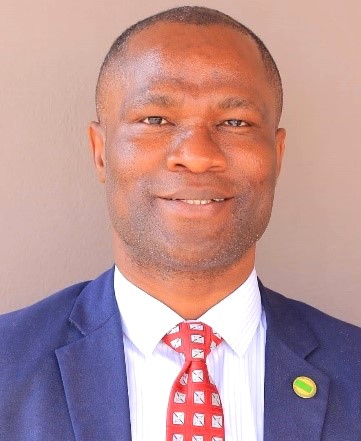
Dr. Innocent Adebayo graduated with a medical degree (MBBS) from the University of Ilorin, Nigeria in 2006 and completed his residency in Paediatrics at the University of Abuja Teaching Hospital in 2018 with a Fellowship in Paediatrics (FMCPaed). Dr Adebayo’s completed his Paediatric Haematology and Oncology Fellowship Training in in 2021 from Makerere University College of Health Sciences, supported by the Texas Children’s Hospital Global HOPE program. He recently, in 2024, obtained a Fellowship in Palliative Medicine from the Institute of Palliative Medicine in India/St Christopher’s Hospice in London, United Kingdom. Dr Adebayo’s areas of interest are newborn screening, disease severity and hematopoietic stem cell transplantation in Sickle Cell Disease.
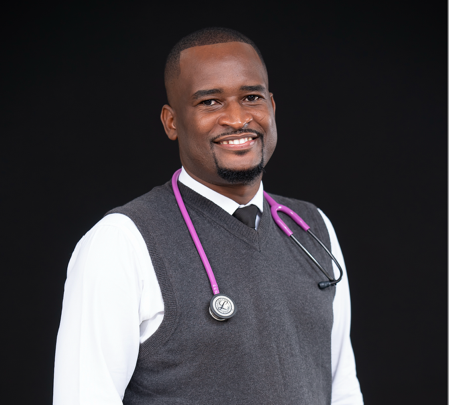
Dr. Rizine Mzikamanda is a specialist consultant in Pediatrics and Pediatric Hematology and Oncology at Baylor College of Medicine Children’s Foundation Malawi and Malawi National Cancer Center at Kamuzu Central Hospital (KCH). He is the Medical Director of the Global Hematology Oncology Pediatric Excellence Program in Malawi.
Dr. Mzikamanda completed his medical degree at the University of Malawi, College of Medicine (now Kamuzu University of Health Sciences- KUHES) in 2010, specialization in pediatrics at the University of Malawi, College of Medicine and University of Pretoria in 2018, and pediatric hematology and oncology fellowship at Makerere University in 2021 supported by Texas Children’s Global HOPE.
His vision is to become one of the leading clinical researchers in childhood leukemia and lymphoma in Sub-Saharan Africa (SSA). He is interested in developing locally appropriate treatment strategies for children in SSA and leading clinical trials in childhood cancer in this region over the next 5-10 years.
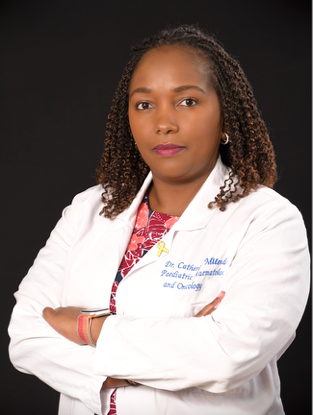
Dr. Catherine Muendo is a paediatric haematologist and oncologist working at the paediatric hematology and oncology department in Kenyatta National Hospital, Nairobi, Kenya. She is the head of unit at the Hemophilia comprehensive care centre at Kenyatta National Hospital. She is the vice chair of the Paediatric Hematology Oncology Society of Kenya.
She completed her medical degree at the University of Nairobi in 2010, and specialized training in paediatrics and child health at the University of Nairobi in 2017. She completed her paediatric hematology and oncology fellowship training at Makerere University College of Health Sciences, supported by Texas Children’s Global HOPE in 2021
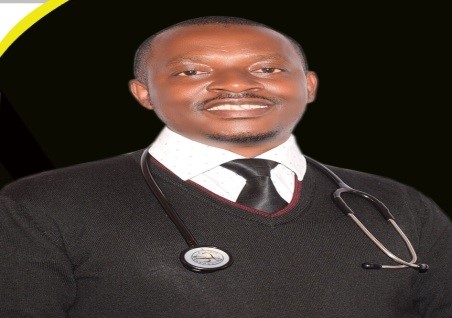
Dr. Emma Nsalazi Bambi is a Congolese paediatrician and subspecialist in paediatric haematology and oncology, currently pursuing a Clinical Fellowship in Transfusion Medicine at McMaster University in Hamilton, Ontario, Canada. He holds a Master of Medicine in Paediatrics and Child Health from Makerere University, Uganda, and completed fellowship training in Paediatric Haematology and Oncology at Makerere University College of health Sciences Texas Children’s Global HOPE.in 2021.Dr. Bambi began his medical career after obtaining his Doctor of Medicine degree from Goma University in the Democratic Republic of Congo, and specialized training in pediatrics and child health at Makerere University.
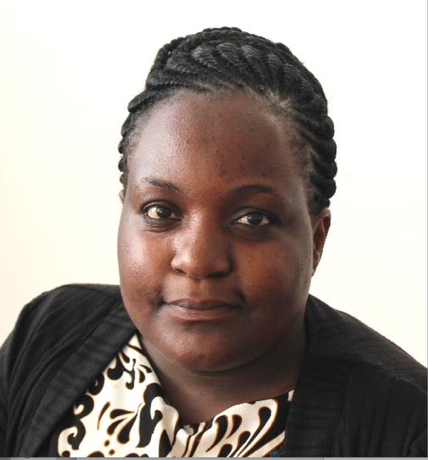
Dr. Annet Nakirulu completed her medical degree (MBChB) at Kampala International University in 2012, higher diploma in Paediatric palliative care at Mildmay Uganda in 2016, specialization in paediatrics at Uganda Martyrs University Post graduate School Nsambya in 2019 and pediatric hematology and oncology fellowship at Makerere University College of Health Sciences in 2021
Dr. Annet Nakirulu is an associate consultant in Pediatric hematology at the Directorate of Pediatrics at Mulago National Referral Hospital. She provides evidence-based interdisciplinary medical care to children with sickle cell disease, plans and leads Paediatric Hematology Oncology education and outreach activities within the local and national community. She also participates in research, clinical quality improvement and program monitoring and evaluation activities for children with cancer and blood disorders at Mulago National Referral Hospital in collaboration with Texas Children’s Hospital Global HOPE Program.
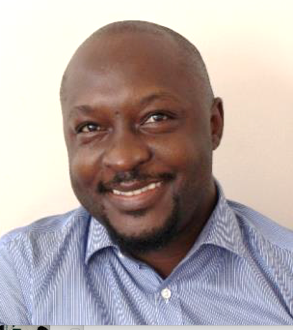
Dr. Moses Karashani began his medical journey at China Medical University, where he received comprehensive training in general Paediatrics and Child health. Driven by a passion for advancing care in childhood blood disorders, he pursued a fellowship in Paediatric Haematology and Oncology at Makerere University College of Health Sciences Texas Children’s Global HOPE, completing it in 2021
Currently, Dr. Karashani serves at the Muhimbili National Hospital, Mloganzila campus in Tanzania. His clinical and research interests focus on the management of both benign and malignant haematologic conditions in children, aiming to improve outcomes through evidence-based approaches and targeted therapies. His work bridges the gap between bedside care and academic inquiry, making him a vital contributor to Tanzania’s growing Paediatric haematology and oncology landscape.
Cohort 2020/2022
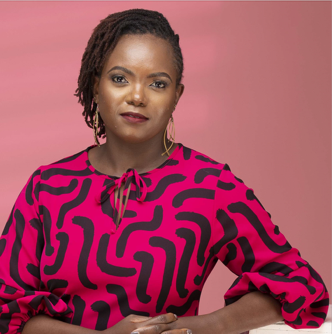
Dr. Rose Munge is the Head of Unit -Paediatric Haematology and Oncology at Kenyatta University Teaching, Research and Referral Hospital (KUTRRH) and a lecturer in the Department of Paediatrics at Mount Kenya University. Dr. Munge played a key role in establishing paediatric oncology services at KUTRRH, culminating in the successful commissioning of the unit in 2024. She is also an active member of the Ministry of Health’s Technical Working Group on Childhood Cancer and is actively involved in the establishment of the Kenya Paediatric Haematology and Oncology Society. She earned her medical degree from the University of Nairobi in 2008 and completed specialized training in paediatrics at the same institution in 2015. In 2023, she completed a clinical fellowship in paediatric haematology and oncology at Makerere University College of Health Sciences supported by Texas Children’s Global HOPE. She also holds additional training in healthcare leadership from the University of Washington. Dr. Munge is passionate about expanding local fellowship training opportunities in paediatric haematology and oncology and is committed to advancing research-driven, high-quality cancer care for children across Kenya.
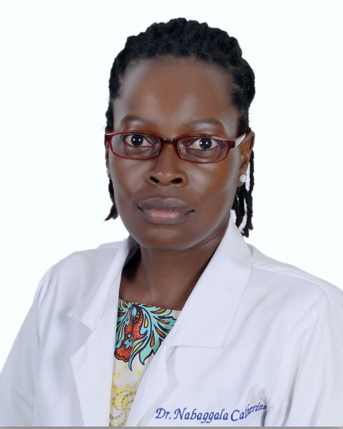
Dr. Catherine Nabaggala is a Paediatric Haematology and Oncology Specialist at Global HOPE (Haematology-Oncology Paediatric Excellence) Program in Uganda, based at Mulago National Referral Hospital. Dr Nabaggala completed her medical degree at Makerere University in 2004, specialized in Paediatrics at Makerere University Medical School in 2013 and Paediatric Haematology and Oncology fellowship at Makerere University in 2023 supported by Texas Children’s Global HOPE. Her vision is to scale up essential care for children with haematological disorders especially Sickle cell disease to the most vulnerable children living in primary health care settings.
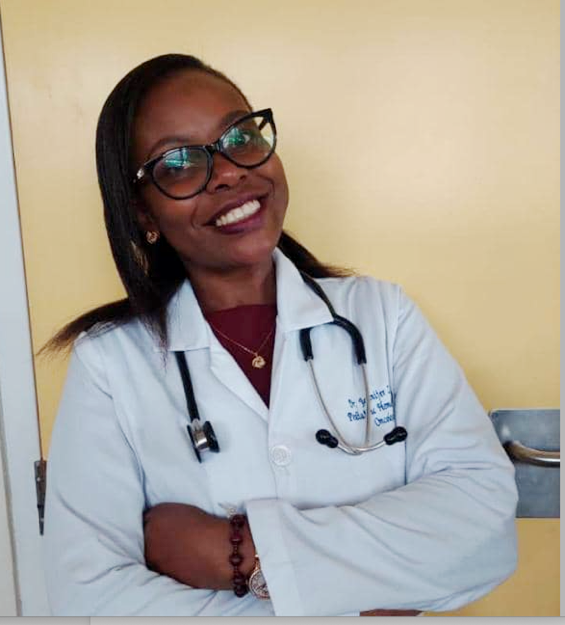
Dr. Jennifer Zungu is the Director of The Texas Children’s Global HOPE program in Uganda. She holds a Bachelor of Medicine and Bachelor of Surgery from Makerere University, a Master of Medicine in Paediatrics and Child health from Mbarara University of Science and Technology (MUST), and a Diploma in Health care Management from The Kenya Institute of Management (KIM). She completed her clinical fellowship training in paediatric haematology and Oncology at Makerere University Supported by Texas Children’s Global HOPE.
Dr. Zungu is passionate and deeply committed to, driving better outcomes in Paediatric Haematology and Oncology. She uses her experience in healthcare management along with her clinical training in Paediatric Haematology-Oncology to advocate for evidence-based paediatric haematology and oncology care, best quality services, and excellent customer experience in the Public Healthcare sector in Uganda and beyond.
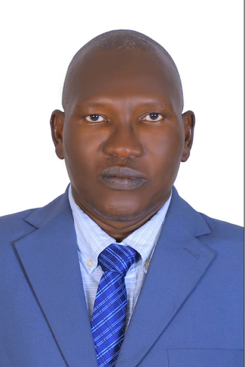
Dr. Joseph Gore is Head of the Pediatric Hematology & Oncology Unit at Alsabbah Children Hospital in Juba, and Senior Lecturer at the University of Juba, with a focus on improving sickle cell disease care & oncology services in South Sudan.
You may like
-


Over 9,200 to graduate at Makerere University’s 76th Graduation
-


76th Graduation Highlights
-


Meet Najjuka Whitney, The Girl Who Missed Law and Found Her Voice
-


Uganda has until 2030 to end Open Defecation as Ntaro’s PhD Examines Kabale’s Progress
-


Mastercard Foundation Scholars embrace and honour their rich cultural diversity
-


When Birth Becomes the Most Dangerous Moment, Wanduru & the Work of Making Labour Safer
Health
Makerere University School of Public Health Graduates First Cohort of Cost-Effectiveness Analysis Short Course
Published
4 days agoon
February 20, 2026By
Mak Editor
Kampala, Uganda – The Makerere University School of Public Health (MakSPH) has marked a significant milestone with the graduation of the first-ever cohort of its Cost-Effectiveness Analysis (CEA) Short Course. The pioneering programme is designed to strengthen capacity in economic evaluation in Uganda and beyond.
The virtual graduation ceremony honored eleven (11) participants who completed the course. The cohort included professionals from academia, research institutions, government agencies, and non-state actors, reflecting the increasing demand for skills in economic evaluation across sectors.
The short course was developed and implemented by the Department of Health Policy, Planning, and Management (HPPM) in response to the increasing need for evidence-informed decision-making in a context of limited resources.
In her remarks during the ceremony, Assoc. Prof. Suzanne Kiwanuka, Head of the Department of Health Policy, Planning and Management (HPPM) at MakSPH, congratulated the inaugural cohort for completing what she described as a “critical and timely” course.
“With decreasing resources and rising demand for services driven by population growth and the emergence of high-cost technologies, decision-makers must make difficult choices,” she noted. “Cost-effectiveness analysis is no longer optional. It is central to conversations in the corridors of power.”
The CEA short course was designed to equip policymakers, researchers, and practitioners with both theoretical knowledge and practical skills in economic evaluation. Participants were introduced to key principles of health economics, costing methodologies, decision-analytic modelling, Markov modelling, sensitivity analysis, and interpretation of incremental cost-effectiveness ratios (ICERs).
According to Prof. Elizabeth Ekirapa, the course lead at MakSPH, this inaugural offering had been “a long time coming,” following years of discussions within the department about building local expertise in economic evaluation.
Delivered over 10 days through interactive online sessions, the course combined lectures, case studies, and hands-on modelling exercises using contextually relevant datasets. Participants were required to develop and present applied cost-effectiveness projects as part of their assessment, allowing them to translate theory into practice.

During the feedback session at the graduation ceremony, faculty emphasized the importance of clarity in defining study perspectives, selecting appropriate outcomes, and aligning research questions with modelling approaches.
Dr. Chrispus Mayora, one of the facilitators, highlighted the need to carefully select outcomes that directly reflect the intervention being evaluated. “When thinking about outcomes, ask yourself: Is this aligned with what I want to study? Interesting outcomes are not always the most appropriate ones,” he advised.
Participants were also encouraged to select modelling techniques such as decision trees or Markov models based on the research question and the nature of the disease or intervention under study.
Prof. Ekirapa described the graduates as “trailblazers,” noting that their feedback would shape future iterations of the course. “When you are the first cohort, you are like pioneers,” she remarked. “We are committed to improving this course to ensure it becomes a world-class programme.”
For many attendees, the graduation ceremony was a new experience, as certificates were awarded virtually an approach that participants welcomed as innovative and inclusive.
“Cost-effectiveness analysis enables us to maximise value for money,” noted Dr. Crispus Mayora of MakSPH. “It allows decision-makers to compare interventions systematically and ensure that limited resources achieve the greatest possible benefit.”
The programme aligns with Makerere University’s broader mandate to provide high-quality training that responds to national and regional development priorities. Participants who successfully complete the course receive a certificate signed by the Dean of the School of Public Health.
As the ceremony concluded, faculty encouraged continued engagement beyond the classroom. Graduates were urged to refine their project ideas and collaborate with the department in advancing research and policy discussions.
The successful completion of the first CEA short course marks an important step in building a cadre of professionals equipped to conduct rigorous economic evaluations. With plans to expand and refine the programme based on participant feedback, the HPPM department under MakSPH is positioning itself as a regional leader in health economics and policy analysis training.
Health
Uganda has until 2030 to end Open Defecation as Ntaro’s PhD Examines Kabale’s Progress
Published
6 days agoon
February 18, 2026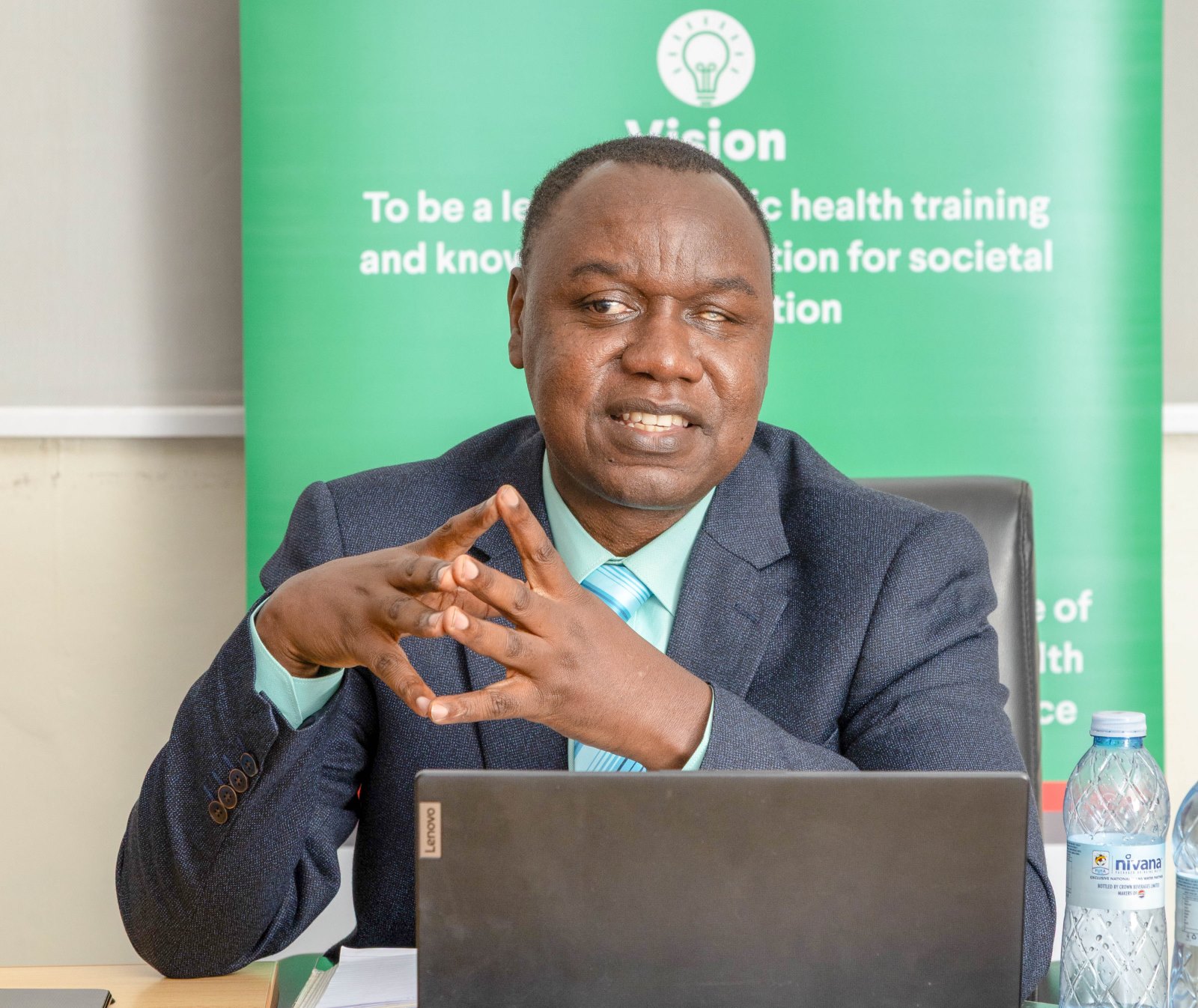
Silhouettes slip along narrow paths, farmers heading to their gardens, women balancing yellow jerrycans on their hips, children in oversized sweaters hurrying to school, and herders steering cattle toward open pasture, each movement part of a choreography older than memory. This is a quiet ritual in Kabale’s terraced hills, moments before the sun lifts.
The quiet procession to ahakashaka, or omukishaka, often sees figures moving quickly along familiar footpaths in the half-light, as children and adults walk with the urgency of habit. It is not a stroll but often a small, hurried run before daylight exposes what should be private.
It is February 2026, and the century-old Makerere University is celebrating its 76th Graduation Ceremony. The world paces and races toward artificial intelligence and digital revolutions. But some families still begin their day by rushing to the bushes for relief and concealment, while others engaged in economic activities such as gardening and grazing have no sanitation option other than using their surroundings to respond to the nature call!
The deadline to end open defecation is 2030. The science is settled, and the commitments are written into Sustainable Development Goal 6. Yet in parts of Kabale, only a small fraction of households is truly open defecation free.
In his PhD research, Dr. Moses Ntaro did not start with global targets or conference declarations. He began where the morning run ends, at the edge of the compounds, behind banana stems, along worn paths leading to Omukishaka. He asked whether students, equipped not with bricks but with conversation, follow-up, and persistence, could help communities replace that dash with something quieter: a door that closes.
What he found is both hopeful and unsettling. Change is possible. But dignity, like sunrise, should not require a run. And with 2030 approaching, time is no longer generous.
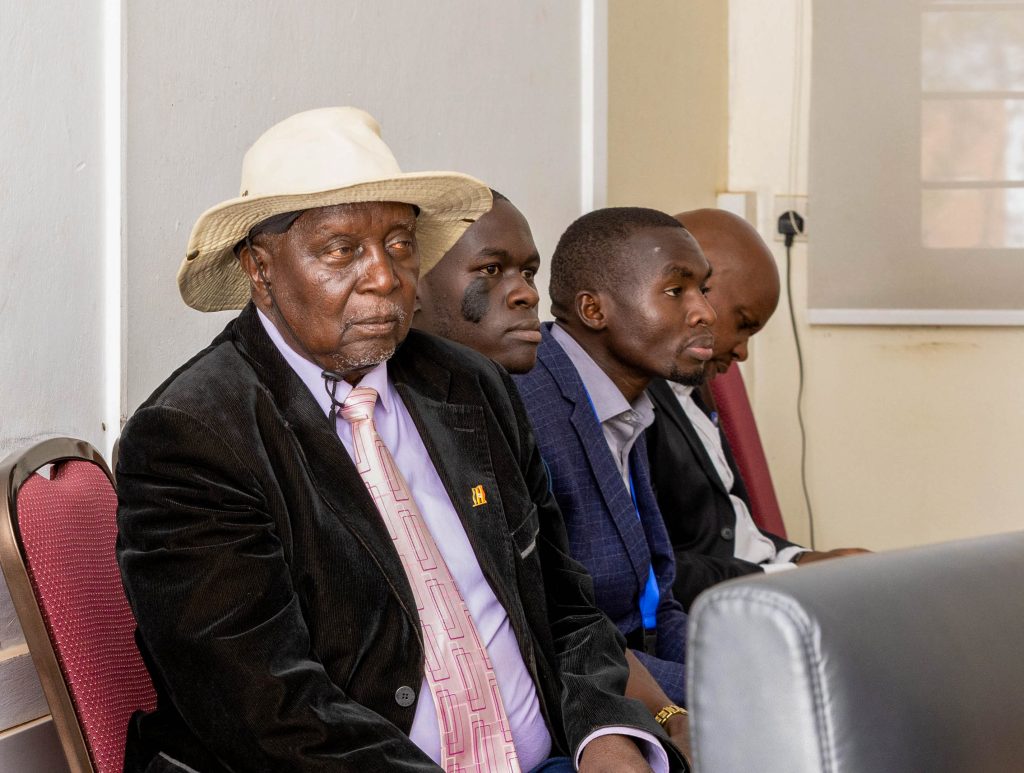
The Question That Would Not Let Him Go
Ntaro did not encounter open defecation as a statistic. While on foot and serving as Assistant Coordinator of Community-Based Education at Mbarara University of Science and Technology (MUST), he learned while supervising students placed in rural communities across southwestern Uganda. They walked villages together, conducted transect walks… and they observed.
“In my role as academic coordinator,” he explains, “students always took me on transect walks within the villages to show me how high open defecation practice was. The effect was evident in the high prevalence of intestinal infections we saw in health facility records.”
The link between sanitation and disease was not theoretical but visible in clinic registers. Diarrhea, intestinal worms, recurring infections among children, and more were all visible in the clinic registers.
Nineteen years ago, in 2007, Uganda adopted Community-Led Total Sanitation (CLTS), a strategy designed to trigger collective behavior change and eliminate open defecation. Progress, however, remained uneven. That same year, Ntaro was working as an Environmental Health Officer with the Water and Sanitation Development Facility under the Ministry of Water and Environment. He was three years away from completing his Environmental Health degree at Makerere University School of Public Health.
And so, the question emerged, to Ntaro, that, ‘If students are already embedded in these communities through COBERS placements, why are we not intentionally harnessing them to accelerate sanitation change?’
That question became his PhD.
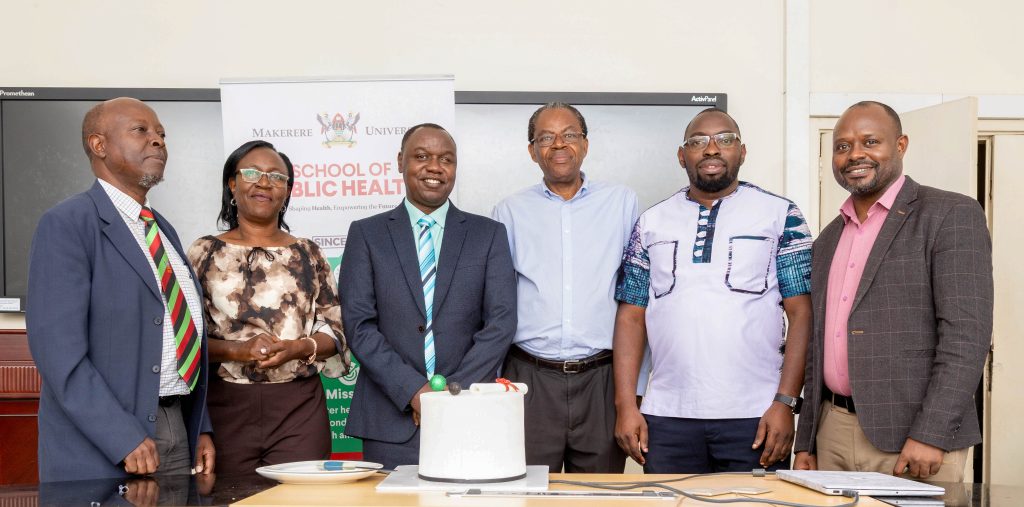
This is a Crisis That Should No Longer Exist
Globally, more than 350 million people still practice open defecation. Sub-Saharan Africa carries a disproportionate share. SDG 6, specifically Target 6.2, commits the world to ending open defecation and ensuring universal access to safe sanitation and hygiene by 2030. It prioritizes women, girls, and vulnerable populations. It speaks of dignity, of safely managed services, and of disease prevention.
We are four years away from that deadline. And in rural Kabale District, somewhere in southwestern Uganda, Ntaro’s research found that only 3 percent of households were truly open defecation-free.
Yes, three percent. His 2025 BMC Public Health study examined 492 residents. The average age was 49. Nearly 30 percent had no formal education. Most were women, the custodians of household hygiene and child health.
The determinants of Open Defecation Free (ODF) status were deeply behavioral.
Male-headed households had higher odds of being ODF. Households with clean compounds, clean latrine holes, and consistent handwashing practices were significantly more likely to sustain sanitation improvements.
Sanitation, Ntaro realized, is not only infrastructure but also power, memory, habit, and social expectation.
“Factors associated with ODF status were not just economic,” he notes. “They were behavioral and contextual.”
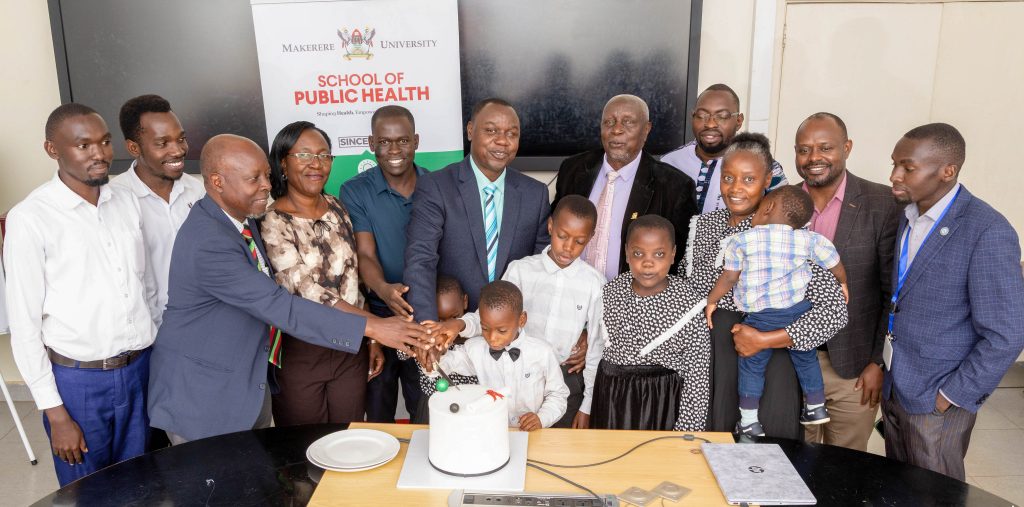
Why It Feels So Wrong to Still Discuss This
Talking about open defecation in 2026 feels unsettling for three reasons. First, it feels like a failure of basic dignity.
Think of an era of global connectivity and rapid technological advancement, and hundreds of millions still lack privacy. For women and girls, this exposes them to harassment, exploitation, and fear. Sanitation is not just about disease but safety.
Second, it feels like an avoidable health crisis. One gram of feces can contain millions of viruses, bacteria, and parasites. Open defecation directly fuels cholera, typhoid, diarrhea, and environmental enteropathy, a silent contributor to child malnutrition and stunting. The science is settled, and yet the practice persists.
Third, it feels like a poverty trap. Illness leads to lost productivity; lost productivity deepens poverty, and poverty limits investment in sanitation. The cycle continues.
“Open defecation is not simply a sanitation issue,” Ntaro says. “It is linked to poverty, nutrition, and broader development.”
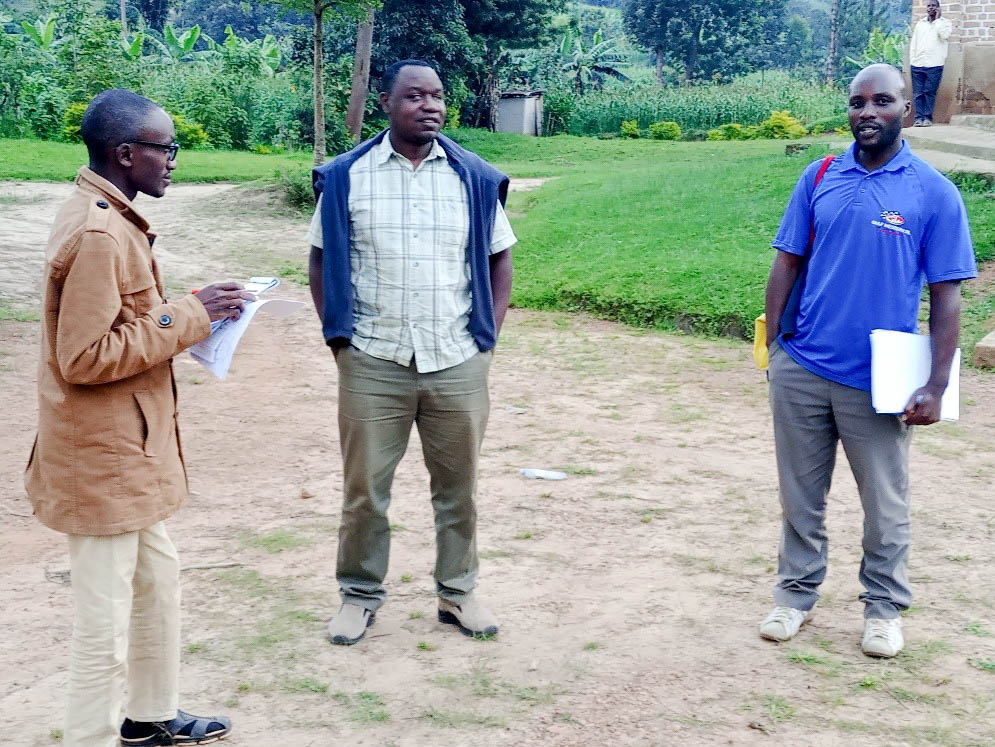
Testing a Different Approach
Ntaro’s doctoral thesis, “Effect of Student Community Engagement on Open Defecation-Free Status,” tested whether health profession students could effectively facilitate Community-Led Total Sanitation.
In some villages, traditional Health Extension Workers led the sanitation process. In others, trained students facilitated it under the COBERS (Community-Based Education, Research, and Service) model, which places medical trainees in community health facilities to learn through real-world practice, bridging classroom theory with primary care and public health work in rural settings.
Through this model, students led triggering, follow-ups, and community engagement. Open defecation declined. More households achieved Open Defecation Free status. And the cost per household was lower than in traditional approaches.
“Students were more effective,” Ntaro explains. “More households became open defecation-free compared to the traditional approach. And they were a cheaper human resource.”
But cost was not the real breakthrough. Presence was. Students stayed for weeks. They returned to check on latrines. They built trust. They kept coming back. Because sustainability, Ntaro argues, is not built in a single visit. It is built in repetition.
“There is a need for continued follow-ups and continued student engagement if long-term impact is to be realized.”
Change cannot be declared once and forgotten.
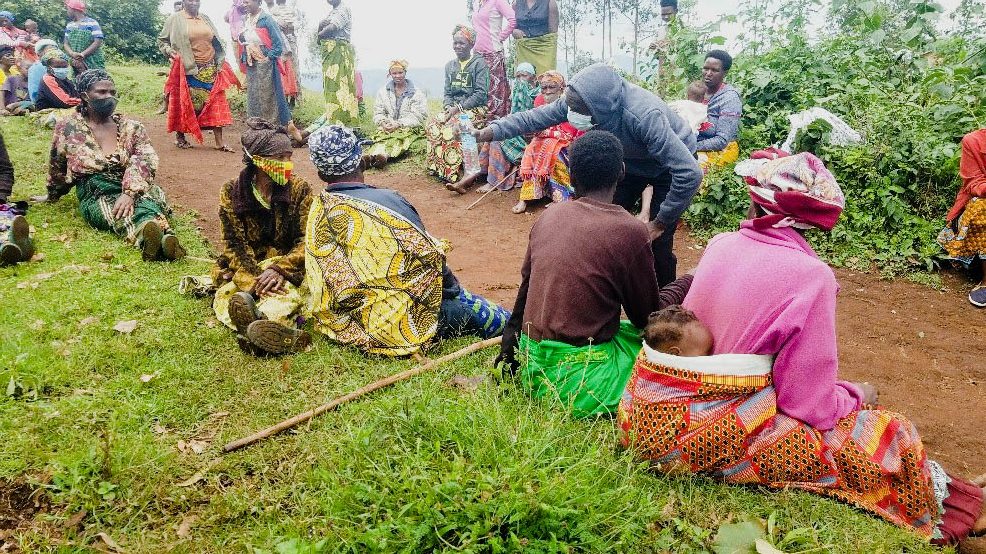
Behavior… and Not Just Bricks
Using the RANAS framework, Ntaro found that households that remembered to wash hands and kept latrines clean were far more likely to sustain Open Defecation Free status. In sanitation, behavior leaves evidence.
“Behavioral change interventions that empower communities,” he recommends, “such as CLTSH, should be strengthened to increase households with ODF status.”
In other words, building latrines is not enough, but communities must believe in them.
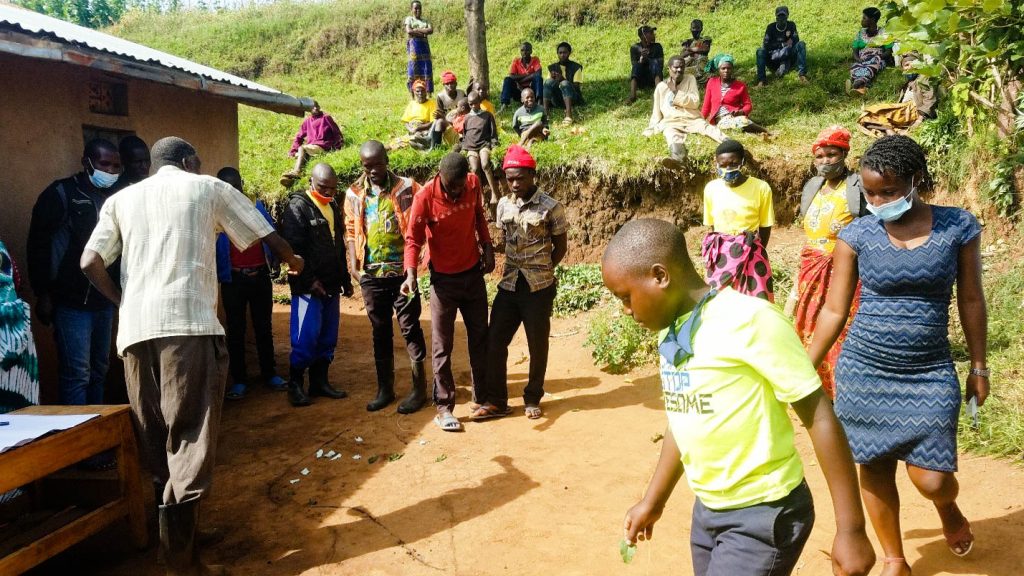
The Defense and the Countdown
On December 11, 2025, Ntaro defended his PhD. Examiners pressed him on scale and sustainability. Could student engagement be institutionalized? Could universities be embedded in district sanitation planning?
His answer was pragmatic: “Yes, but community-based education must be included in planning and budgeting.”
Four years remain to meet SDG 6.2. Four years to end open defecation and turn dignity from promise into practice. In 2026, this conversation should feel outdated. Instead, it remains urgent.
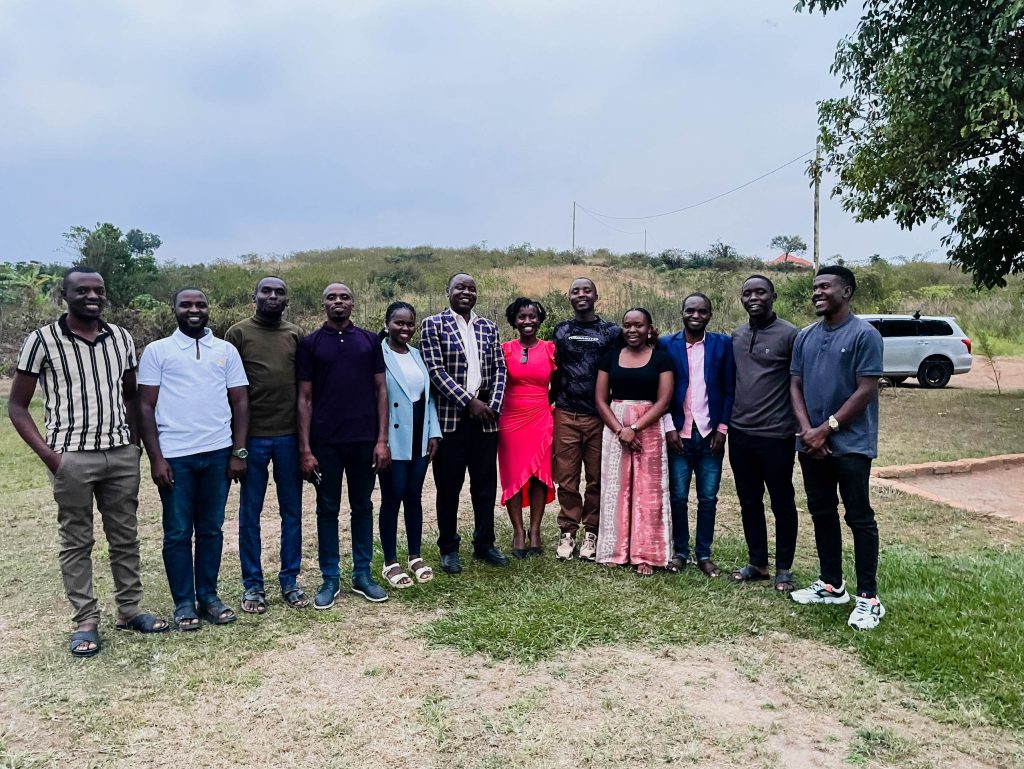
The Slow Work of Restoration
In Kabale, progress does not look dramatic. It looks like a latrine door closing firmly behind someone, a handwashing station with water and soap, a compound swept clean. It looks like a child who does not fall ill this month. Public health victories are often quiet.
As Makerere University approaches its 76th Graduation Ceremony, Dr. Ntaro Moses stands among its PhD graduands not with theory alone, but with evidence that change can be accelerated by reimagining who leads it. Students, he shows, are not only learners. They are the workforce, facilitators, and bridges between policy and path.
The hills of Kabale still wake under mist. But in more compounds now, privacy exists where bushes once stood open. Dignity is not restored in headlines, but one household at a time.
And with 2030 approaching, Ntaro’s work leaves a final, unavoidable question: if we already know how to end open defecation, if we already have the tools, the evidence, and the people, what, exactly, are we waiting for?
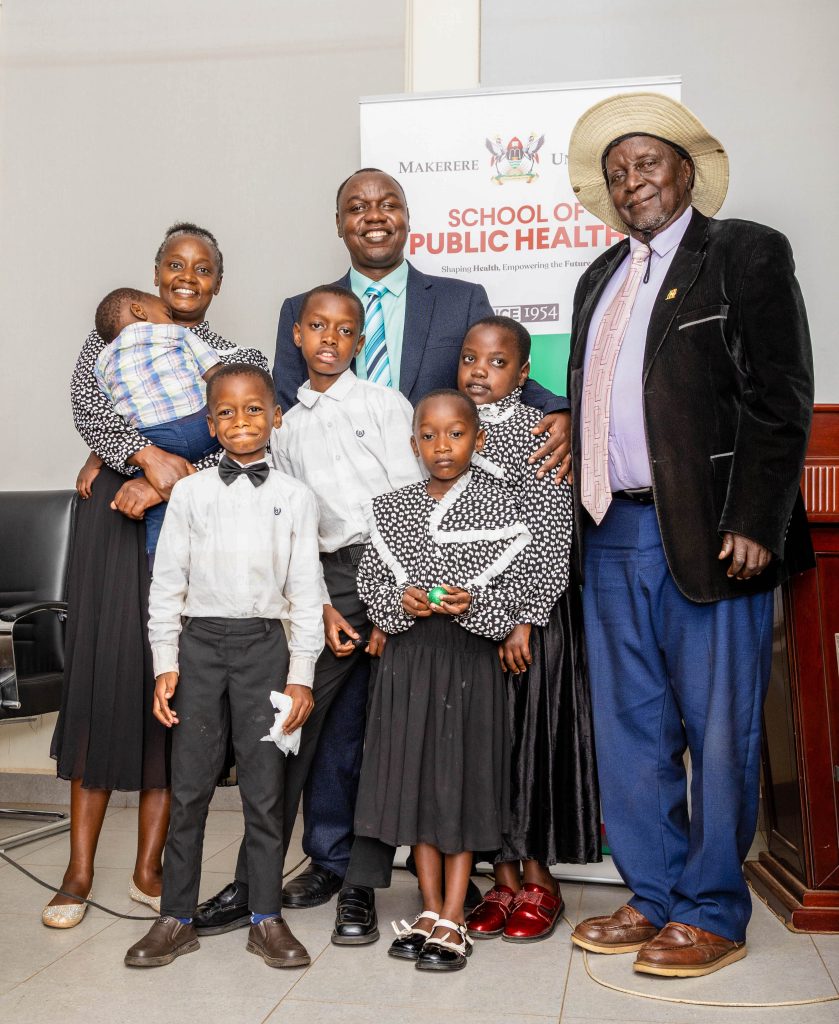
— Makerere University School of Public Health Communications Office, Graduation Profiles Series, 76th Graduation Ceremony
Health
Olivia Nakisita and the Quiet Urgency of Adolescent Refugee Health
Published
6 days agoon
February 18, 2026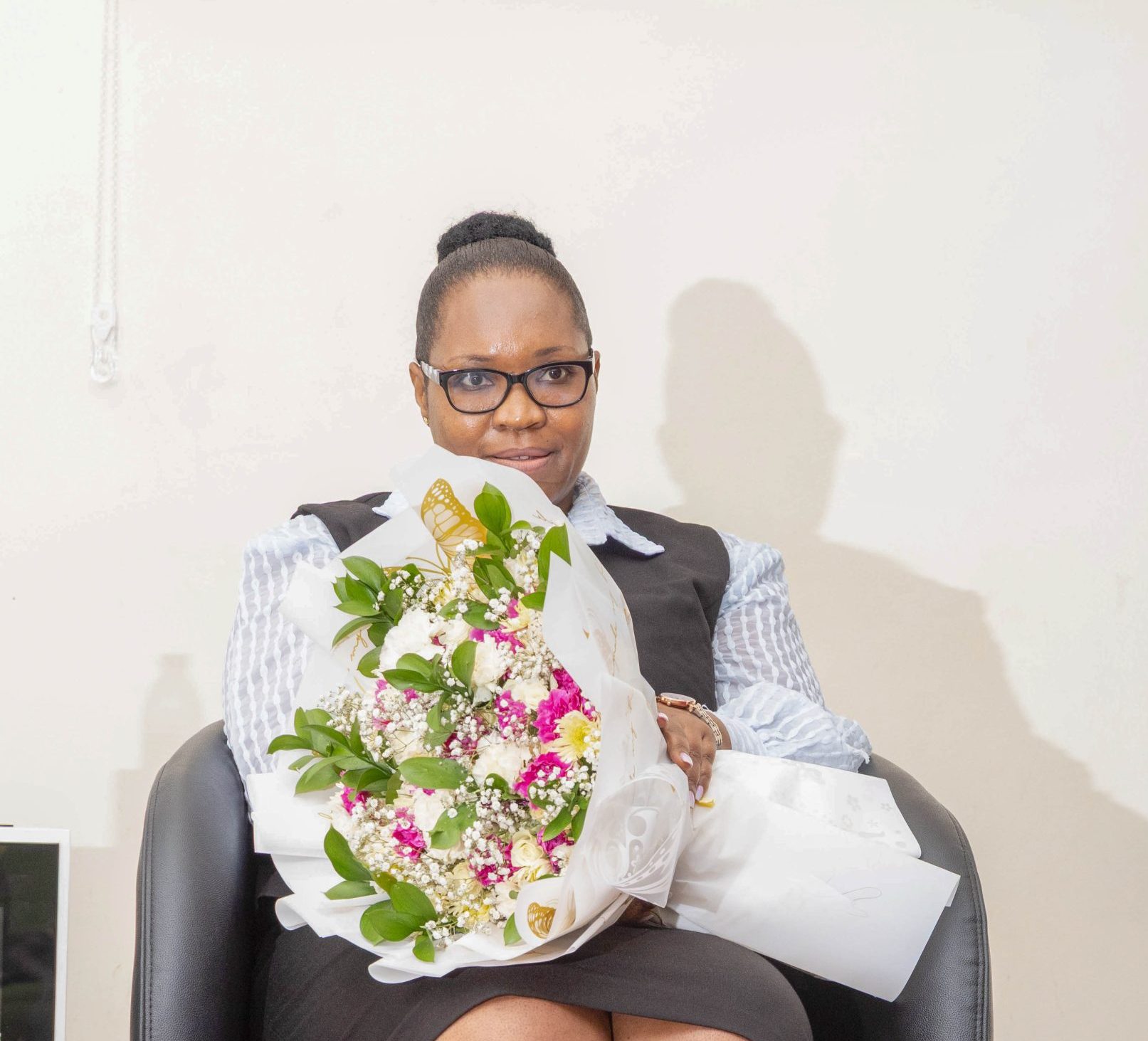
Kampala wakes early, but for some girls, the day begins already heavy. In Uganda, nearly three-quarters of the population is under 30, growing up happens fast, and often without protection. One in four Ugandan girls aged 15–19 has already begun childbearing, giving Uganda the highest teenage pregnancy rate in East Africa.
Layered onto this is displacement. The country hosts about 1.7 million refugees, many living in cities like Kampala, where survival depends on navigating systems not designed with them in mind. Also, nationally, 1.4 million people live with HIV, and 70 per cent of new infections among young people occur in adolescent girls, a reminder that vulnerability is rarely singular. When COVID-19 shut the country down, the consequences were immediate, with pregnancies among girls aged 15–19 rising by 25.5 per cent, while pregnancies among girls aged 10–14 surged by 366 per cent.
The numbers tell a story of youth, risk, and quiet urgency. But they do not tell it all. For years, Olivia Nakisita, a public health researcher,has followed how adolescent girls, many of them refugees, navigate pregnancy in Kampala: how far they must travel for care, how early they arrive or delay, and how often services that exist fail to meet them where they are. Her work lives at the uneasy intersection of policy and lived reality, where access does not always translate into care.
February 25th 2026, is the day that her work on whether urban health systems are truly ready for the youngest mothers they now serve will bring her to Freedom Square at Makerere University, where she will graduate with a PhD in Public Health.
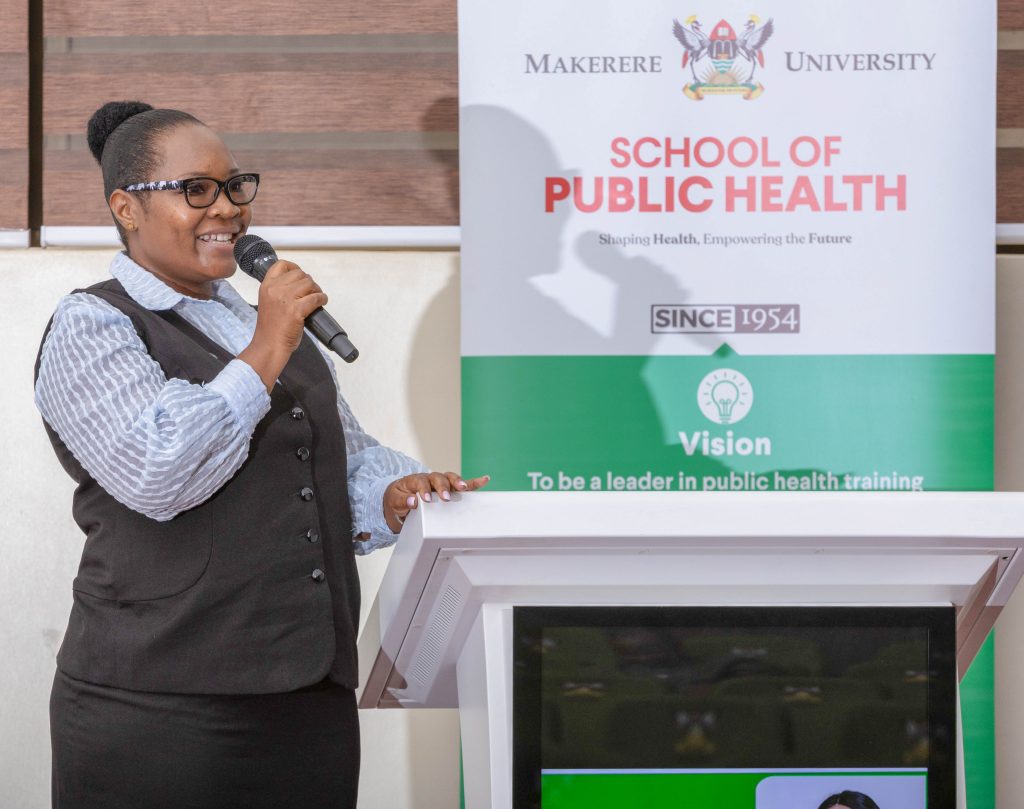
Her doctoral journey, focused on maternal health services for adolescent refugees in urban Uganda, has unfolded at the intersection of scholarship, community service, and the daily realities of young girls navigating pregnancy far from home.
The Work That Came Before the Question
Long before she began writing a PhD proposal, Olivia Nakisita was already immersed in adolescent health. As a Research Associate in the Department of Community Health and Behavioral Sciences at Makerere University’s School of Public Health, she taught graduate and undergraduate students, supervised Master’s research, and worked closely with communities. Beyond the university, she led New Life Adolescent and Youth Organization (NAYO), a women-led organisation she founded in 2021 to strengthen access to sexual and reproductive health and rights (SRHR) information and services for adolescents and young people.
It was through this community work that a troubling pattern began to surface.
“During our community service,” she explains, “we noted increasing teenage pregnancies, and we also noted challenges with access to maternal health services by teenage pregnant girls.”
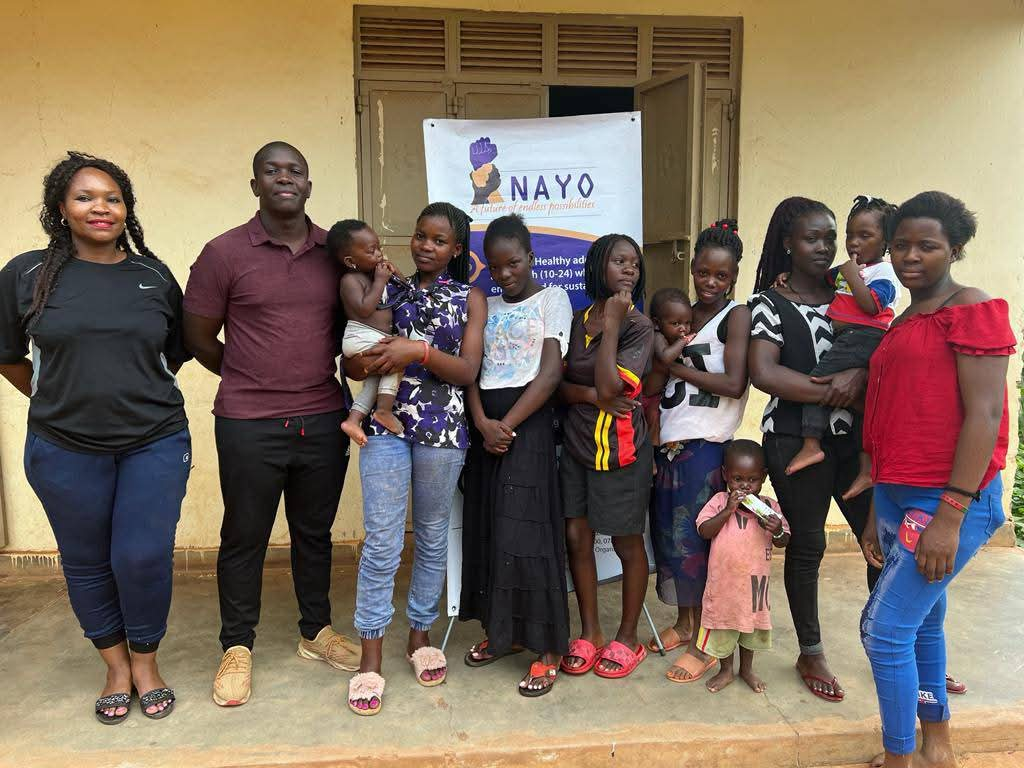
Among those girls were adolescents living as urban refugees in Kampala, young, displaced, often poor, and navigating pregnancy in a city not designed with them in mind.
For Nakisita, the concern deepened through her academic training in Public Health Disaster Management, one such programme that prepares multidisciplinary professionals with the technical expertise and leadership competencies required to plan for, mitigate, respond to, and recover from complex disasters through a public health lens. This programme sharpened Nakisita’s interest in how displaced populations survive within complex urban systems. Uganda’s integrated health model, where refugees and host communities are expected to use the same facilities, appears equitable on paper. In practice, it can be unforgiving.
“I got interested in understanding how these refugees who get pregnant manage to navigate the complexities of integration in host societies like Kampala,” she says. “This was driven by the desire to address their needs and to inform and evaluate existing refugee health policies.”
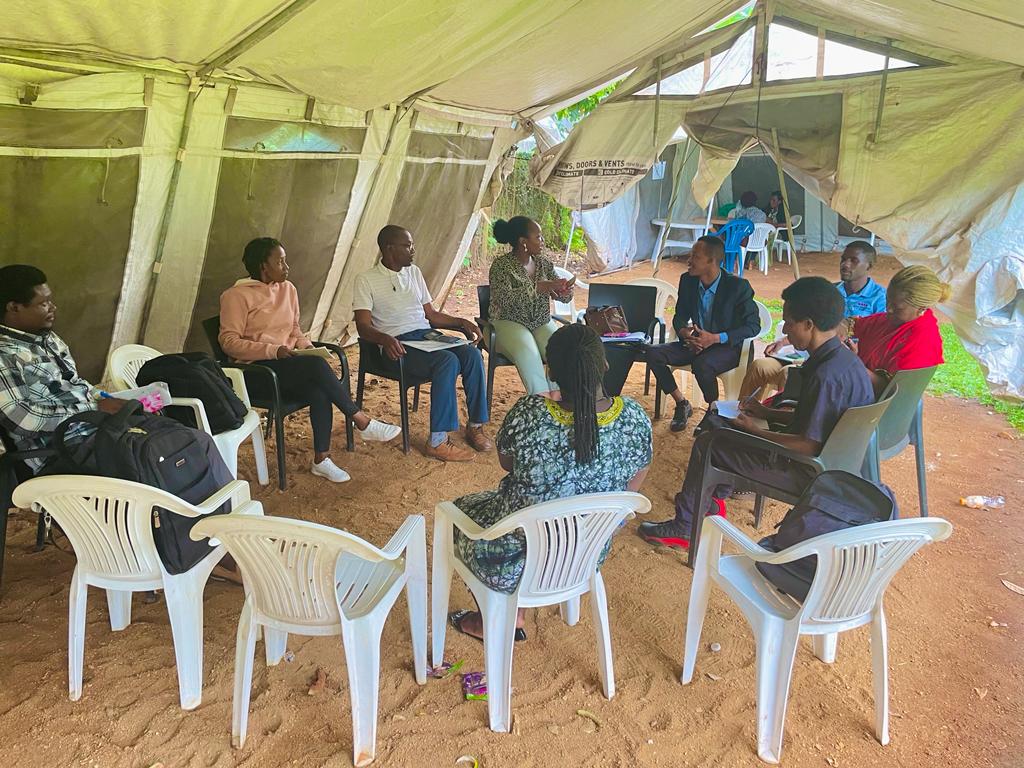
That desire became the foundation of her PhD.
Asking Hard Questions in a Crowded City
Her doctoral research, “Maternal Health Services for Adolescent Refugees in Urban Settings in Uganda: Access, Utilisation, and Health Facility Readiness,” was conducted in Kampala between November 2023 and August 2024. It combined quantitative surveys with qualitative interviews, engaging 637 adolescent refugees aged 10–19 years, alongside health workers and facility assessments.
Her findings showed high perceived access to maternal health services. Clinics existed. Services were available. Yet utilisation, particularly of antenatal care (ANC), lagged. “About three-quarters of the girls attended at least one antenatal visit,” she explains, “but only about four in ten attended in the first trimester.”
And that gap matters. Public health research shows that early and regular antenatal care allows health workers to detect high-risk pregnancies, initiate supplements such as iron and folic acid, monitor fetal development, and provide psychosocial support. Without it, risks compound silently.
By contrast, her study found that facility-based deliveries were remarkably high, with nearly all adolescent refugees (98.3%) giving birth in health facilities, suggesting that the system was reachable, but uneven.
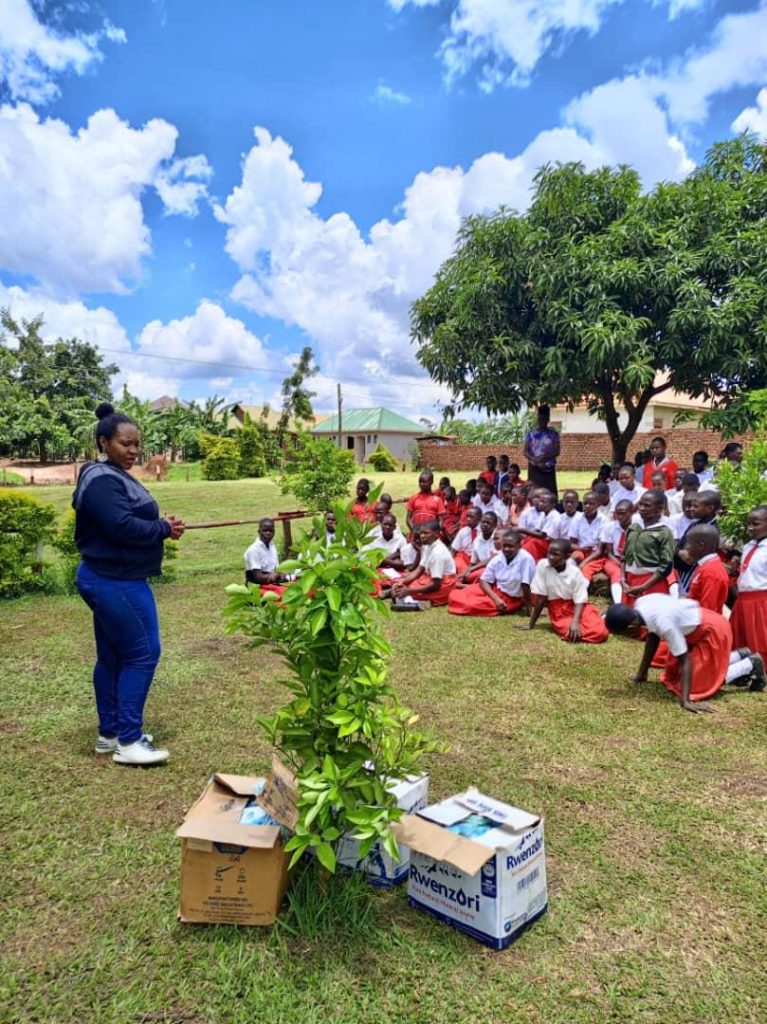
Where the System Falls Short
Her research went beyond utilisation to examine whether health facilities were actually ready to serve adolescent refugees.
Findings show that lower-level health centres in Kampala were moderately prepared to offer adolescent-friendly maternal health services. Some staff were trained. Some spaces existed. Despite this, critical gaps remained. For instance, facilities lacked essential equipment and supplies. Non-provider staff were often untrained. Separate, private spaces for adolescents were limited. Language barriers complicated care. Overcrowding strained already stretched health workers.
In her qualitative interviews, health workers expressed empathy and willingness to help. Many relied on peer educators and community health workers to reach adolescent refugees. But good intentions were not enough.
“They recommended training of healthcare workers, translators for refugees, and improvement in the availability of essential drugs, supplies, and equipment,” Nakisita notes.
She notes that readiness is not just about infrastructure but about the people, preparation, and priorities.
Research with an Emotional Cost
For Nakisita, working with adolescent refugees required care, not only methodologically, but emotionally.
Finding participants in Kampala was itself a challenge. Unlike settlement settings, urban refugees are dispersed, often invisible. Ethical considerations were constant. Adolescents who had given birth were legally considered emancipated minors, but their vulnerability remained.
Though the thesis focused on systems rather than personal narratives, Nakisita’s earlier work with adolescents informed every decision she made. It shaped how she framed questions, interpreted data, and weighed policy implications. This was not detached research, but careful, deliberate, and grounded.
The Scholar Formed by Continuity
Nakisita’s PhD sits atop more than 18 years of experience in training, research, and community service. She is an alumna of Makerere College School (UCE), 1996 and Greenhill Academy Secondary School (UACE), 1998, a long journey through Uganda’s education system before her Diploma in Project Planning and Management at Makerere University completed in early 2000s.
She would later return eight years later to Makerere University for her Bachelor’s degree in Social Sciences and a Master’s in Public Health Disaster Management, and now a PhD in Public Health.
Her academic rigor is reflected in extensive training across SRHR, impact evaluation, research methods, ethics, disaster resilience, and humanitarian health. She has presented at regional and international conferences and published in peer-reviewed journals on adolescent health, refugee maternal care, gender-based violence, and health systems readiness.
As a PhD student, she supervised three Master’s students to completion, with another currently progressing, quietly extending her influence through mentorship.
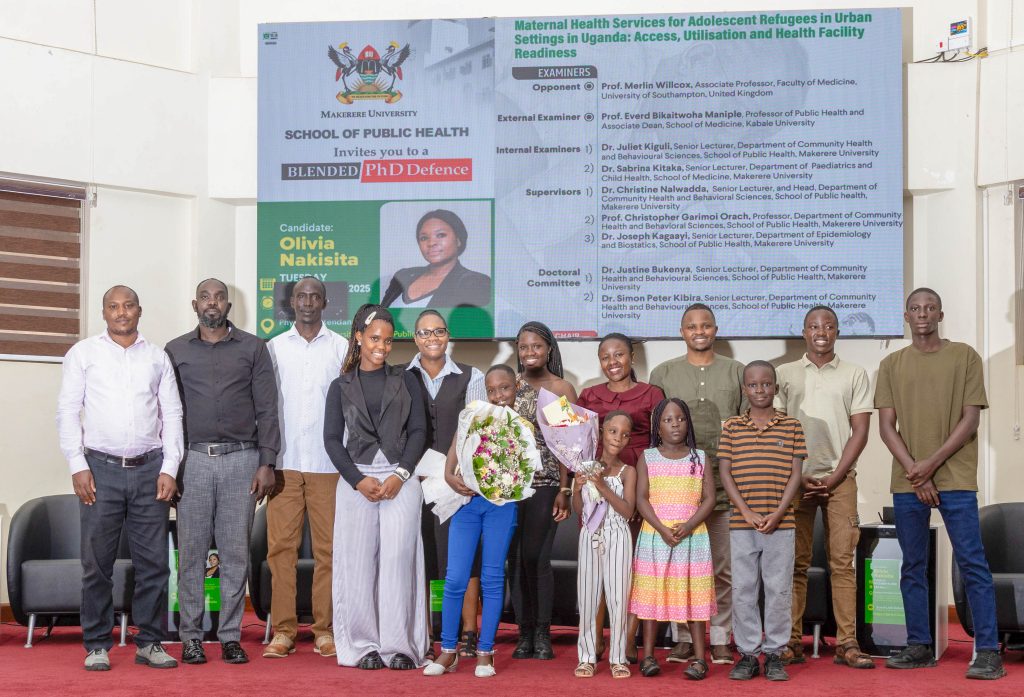
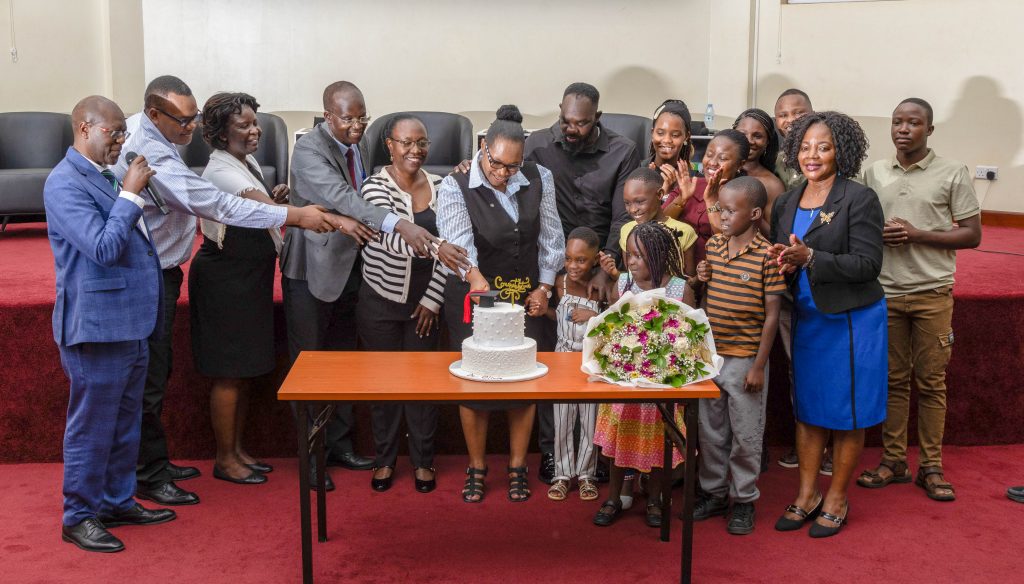
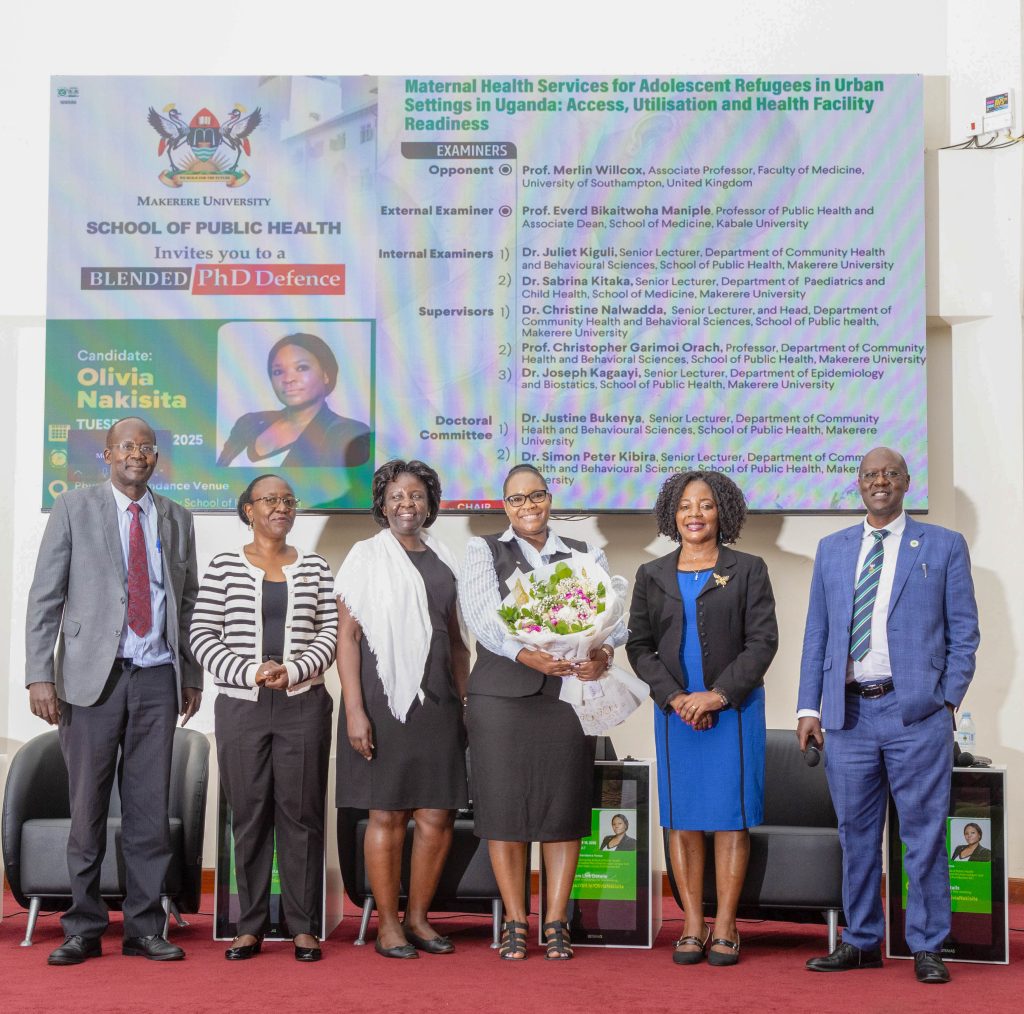
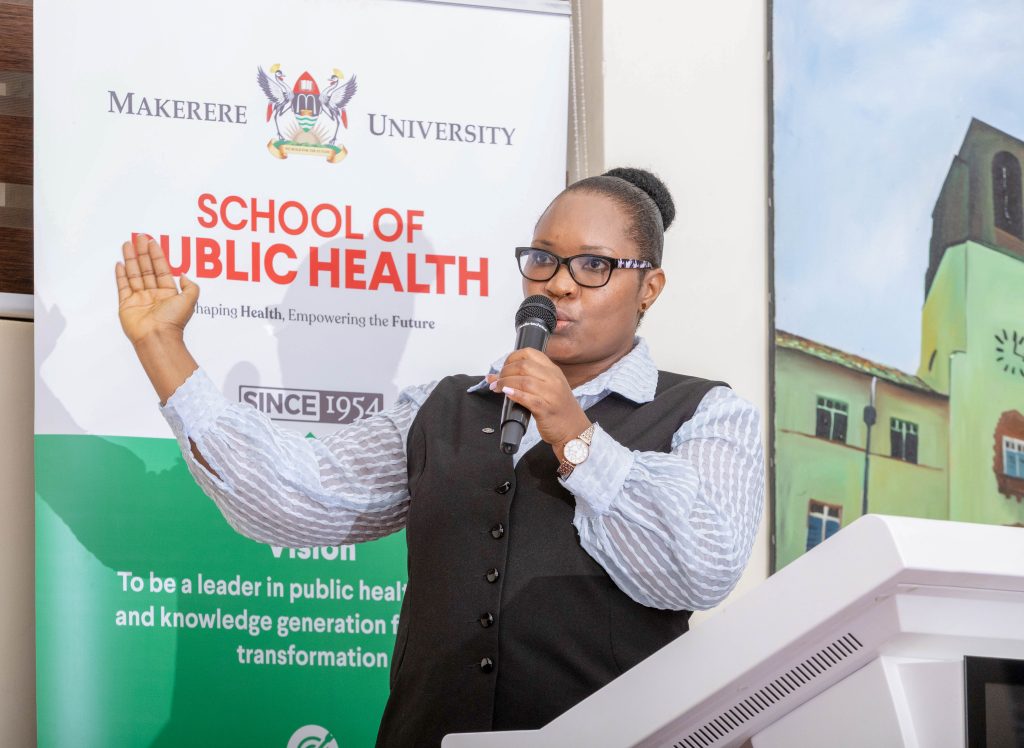
When Evidence Demands Action
If policymakers were to act on one lesson from her research, Nakisita says; “Emphasis should be given to maternal health services for adolescents.” “They are high-risk mothers,” she adds.
Her findings call for targeted community-based interventions, outreaches, home visits, and financial support for adolescents who cannot afford prescribed drugs, delivery requirements, or critical tests like ultrasound scans.
They also call for health systems to move beyond one-size-fits-all models, recognising that age, displacement, and poverty intersect to shape how care is accessed and experienced.
Now that her PhD is complete, Nakisita plans to translate research into action. Several papers from her study have already been published. A policy brief is planned to influence decision-making in urban and humanitarian health settings.
When asked what she would say directly to adolescent refugee girls navigating pregnancy in unfamiliar cities, her response is simple and direct.
“If it happens,” she says, “as soon as you find out, go to the nearest health facility and seek care. Always return for the visits as asked by the health worker. Ensure that you deliver in a health facility with a skilled health worker.”
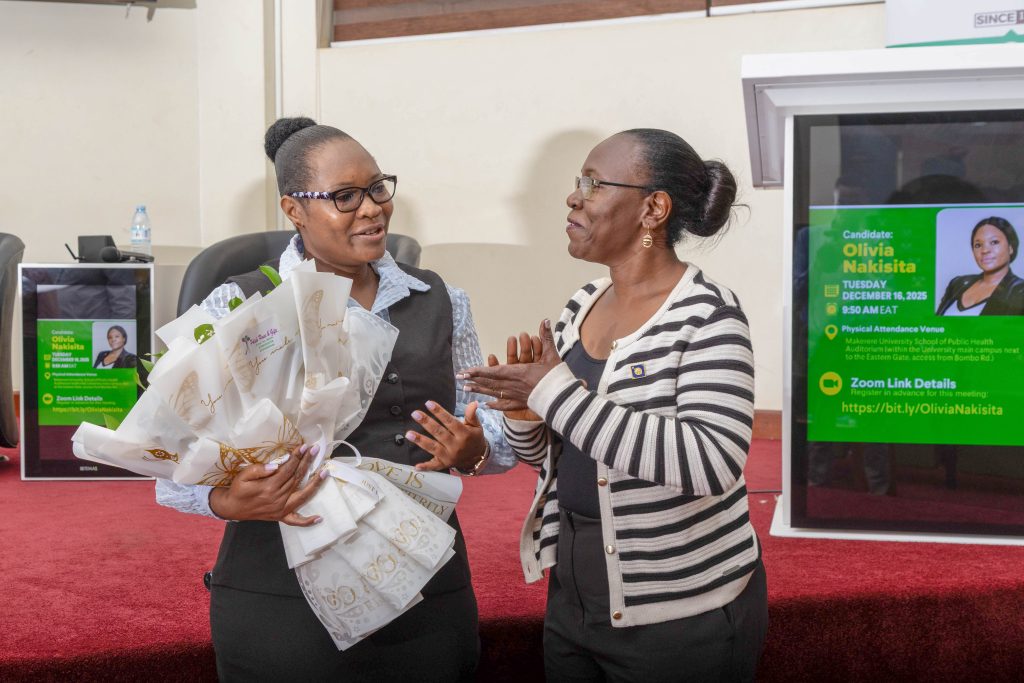
Arrival, Without Illusion
When Dr. Olivia Nakisita steps onto the graduation stage at Freedom Square, applause will follow. But the true significance of that moment lies in health facilities still struggling to adapt; in adolescent refugees whose pregnancies unfold quietly in rented rooms and crowded neighborhoods; in policies waiting to be sharpened by evidence.
Her scholarship does not promise quick fixes but offers clarity.
Among the PhDs conferred at Makerere University’s 76th graduation, her work reminds us that some research does not begin in libraries and does not end with theses. It lives on in the slow, necessary work of making health systems see those they have long overlooked.
— Makerere University School of Public Health Communications Office, Graduation Profiles Series, 76th Graduation Ceremony
Trending
-

 Humanities & Social Sciences2 days ago
Humanities & Social Sciences2 days agoMeet Najjuka Whitney, The Girl Who Missed Law and Found Her Voice
-

 Health6 days ago
Health6 days agoUganda has until 2030 to end Open Defecation as Ntaro’s PhD Examines Kabale’s Progress
-

 Agriculture & Environment5 days ago
Agriculture & Environment5 days agoUganda Martyrs Namugongo Students Turn Organic Waste into Soap in an Innovative School Project on Sustainable Waste Management
-

 General6 days ago
General6 days agoMastercard Foundation Scholars embrace and honour their rich cultural diversity
-

 Health2 weeks ago
Health2 weeks agoCall for Applications: Short Course in Molecular Diagnostics March 2026
